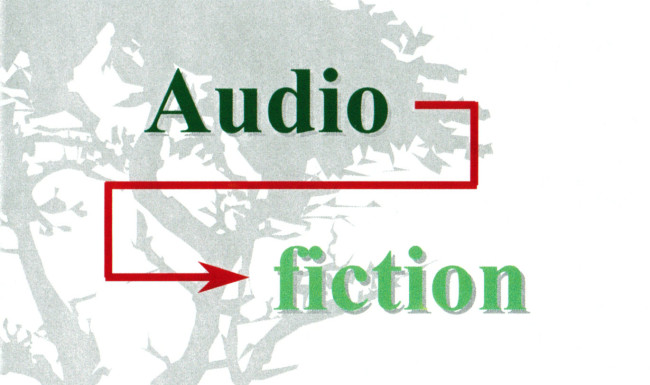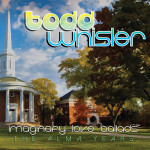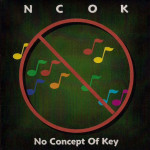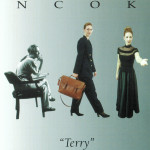Album Notes – Audiofiction
Audiofiction – recorded February – April 1997
Almost immediately upon concluding the recording and mixing of our debut CD A Perfect E, Leyth and I began making plans for a successor. Whereas we previously had all the material and simply lacked a title, this time around we went into the project knowing our title but not knowing exactly what material would comprise the recording. During one of our trips to the local mall, we visited the Barnes And Noble booksellers store since back in 1997 they stocked some music in addition to the expected printed material. In the store was a small section of material which had been committed to tape and/or compact disc for those people who preferred to hear literature rather than read it. This section was called Audio Fiction. It resonated with Leyth immediately – audio, something you hear, and fiction, what most songs or what music in general can be construed to be. In selecting the material, we once again looked to what had already been composed and rehearsed – the remaining songs Leyth had written during his first year in Tucson (Solitude, The Only Place To Go, For A Lost Soul and No Storm) as well as songs that actually predated A Perfect E, (Close As I Will Come, Bach Nein and Saving Grace). The remainder would be new compositions. During the writing phase, I found myself challenging us to explore new chord changes when we for instance needed a bridge. On A Perfect E, we would use a half step change as almost a default – E to F or B to C. Whenever Leyth suggested that, I complained that we’d already used that in Belonging or in In A Sense and couldn’t we come up with something else? To both our credit we did. Having said that, there is a recurring musical theme that underlies several of the songs. I’m sure there’s some technical term for it but it’s the main chord change in most Iron Maiden songs and to some degree in most Heavy Metal songs from the late 70s to mid 80s – E minor, C major and D major. In general, I would say Audiofiction features my most inspired and effective rhythm playing. I’ve never been louder in any mix and I’ve never been more essential to the success of any album. What clinches this album for me emotionally are the last three songs – songs about isolation, rejection and death. We refer to them as the Pit of Oblivion.
- Audio Fiction. When Leyth and I are writing material for an album, the last two tracks we write are typically the opener and closer. It’s a requirement to know where the album is going in general before you figure out how it’s starting or ending. In this vein, Audio Fiction was the second to last song we composed for the album. The raised level of composition is evident in this song alone as it features many changes in key signature, changes in beat (4/4 and 6/8) and changes in tempo. It’s fairly obvious we are not playing to any click track. The song originally had a different midsection. When it was Leyth’s turn to record his solos, he found the section didn’t lend itself to his normal spontaneous crafting of melody and harmony. So we chose to rewrite the section. Since we had no click track, I had to play the new section over the old one in order to play at a consistent tempo. This required me to play completely out of key with what I was hearing. Leyth marveled at my ability to ignore what I was hearing in my headphones. “I couldn’t have done that,” he confessed.
- Enter Fear. In 1997, Leyth lived on the far Northwest side of town and I lived in the Northeast. Enter Fear was composed and arranged over the telephone. I remember holding the phone between my knees (we had no speakerphones at either of our houses) and playing him my ideas. In fact, I suggested calling the song “Between The Knees” but Leyth refused given its obvious suggestive innuendo. After listening, he then composed the next logical idea. The midsection represents the last song from the original Barricades demo – a song we ultimately dismissed and simply repurposed the best idea. This song takes the recurring theme of Emin-Cmaj-Dmaj and transposes it to the key of B minor – Bmin-Gmaj-Amaj.
- Solitude is a song I’ve never been able to appreciate as I’ve never liked my performance. Back then, neither Leyth nor I did any counting of beats or measures. Everything was played by feeling. Now that I’m a little better versed in the technical aspect of rhythm guitar, I can hear that I am playing to the quarter note while Leyth is soloing to the eighth note. As a result, all my strums a half beat late. There’s usually a song on each album that I’m not crazy about but which I record because I trust once Leyth solos over it, it’ll make sense. I do really like it once we switch to the 12 string guitars.
- Close As I Will Come. Back in 1988 while Leyth and I were roommates in San Diego, he was pursuing his Master’s of Business Administration at San Diego State University and I was in my first year of working at General Dynamics. I met a girl there named Margie who I really liked (and who seemed to like me, too) but who had married her high school sweetheart and was unobtainable. I poured my frustration into a poem which I left out on the kitchen table one night. Leyth noticed it that next morning while I was at work and unbeknownst to me, set it to music and recorded a demo version which he played for me that night. I was stunned. That demo became Close As I Will Come which is one of the lines from the original lyric.
- Bach Nein. When Leyth and I first became friends and writing partners, we wrote silly (and often vulgar) songs. Bach Nein is one of the more mature songs we collaborated on in those early days, I think in the suburb of Claremont in San Diego in the fall of 1988. An amusing note of this song was Leyth’s inability to play the very simple opening melody in time. During take after aborted take, I turned to Jim Pavett, our engineer and producer, and asked, “Why doesn’t he just let me do it?” Jim responded simply, “Ego.” After a fruitless 45 minutes, he finally gave up the ghost and let me perform it. This is one of my two synth orchestrations on this CD. I do not remember why I played synth, normally Leyth did it.
- The Only Place To Go. The last thing Leyth and I do is name the songs (unless a name has already previously appeared – see Audio Fiction). Leyth picked a bunch of prospective song titles and then he and I matched title to track. This was the last title that remained from the original batch of 6 titles. “Happiness is the only place to go?” he mused.
- Saturday Mask serves no purpose other than to introduce Run From The Moment. It’s an introductory piece he had played many times before we recorded it in 1997 for this album. It takes its title from the lyrics to Run From The Moment (“They star on your stage in their Saturday mask.”) It’s always been a highlight for me on this CD since a). it really gives insight into Leyth, his compositional ear and his ability to create a complete listening experience simply on a classical guitar and b). although it’s in a major scale which typically heralds a brighter and more optimistic mood, it’s the darkest and most foreboding song on the album.
- Run From The Moment. Our version of Run From The Moment that was recorded for Audiofiction was a compromise. The song was always intended to be sung – the main melody was meant for the human voice and the song lost something when the searing lyric was removed. Having said that, the song still works quite effectively and is a highlight of the album.
- Point Of View is one of those interesting songs where I was simply playing the opening chords one day and Leyth liked them and wrote the rest of the song. It’s one of two songs on the album where I was the primary (or at least initial) composer and then Leyth augmented my idea. What really makes the song work for me is his orchestration on the synthesizer – it introduces so much anguish. This song was always painfully louder than any other track on the original master of the album and I’m glad Jim was able to balance it out so now it’s part of the statement rather than jumping out at you as being disproportionately loud.
- Saving Grace. Back in 1989 in Clairmont, Leyth and I wrote a song called Blind. It featured lyrics that I set to music Leyth had written and a hard rock midsection. It became Saving Grace for this album minus the midsection. It’s a long and weaving fingerpicked verse that I had lost count of while recording my rhythm track. Leyth knew I had spilled over by an entire verse and said nothing because it gave him the chance to play longer! Bastard.
- For A Lost Soul. Oddly enough, or perhaps tellingly enough, what I always hear when I listen to For A Lost Soul is some buzz in my guitar.
- All Twelve. The second song to which I was the initial contributor of music was All Twelve. Normally, my rhythm tracks will consist of two acoustic guitars – my Ovation and Leyth’s Yamaha which I will augment with my Washburn 12 string guitar. This song however consists solely of two 12 string guitar tracks and therefore the title – the rhythm is all 12 string guitar. There is a recurring theme of multiples of the number 3 on this album – Six Under, Bach Nein and All Twelve. This song features the recurring musical theme of E minor, C major and D major which is very beautifully and achingly orchestrated by Leyth on the synth.
- No Storm features a finger picked guitar in 6/8 time for its entire length – no strumming at all. The finger picked notes reminded me of falling drops of rain so I gravitated towards the title that featured an inference to falling rain. Of course, since Leyth is a natural born contrarian, it had to be no storm. Which in fact, it is not. It’s a rhythm guitar!
- Six Under. The Pit of Oblivion begins with Six Under. It wasn’t until Leyth played the harmony guitar solo that I realized this song was about death. For this reason I understood its title not in reference to a golf score but literally being six feet under the Earth. While composing this piece, Leyth gravitated to his old familiar E to F transitional phrase which I challenged him to better. Of course, he did. The brisk and urgent strumming represents the struggle against the inevitability and terror of passing beyond The Great Beyond.
- She’s The One like Run From The Moment was conceived as a proper song with lyrics and vocal melodies. However, unlike RFTM, the melody could be delivered as effectively by the classical guitar rather than the human voice and while the lyrics are good, they aren’t as crucial to the meaning of the song as RFTM’s are. The bitterness and anger which constitute RFTM are best conveyed by the human voice but the sorrow and depression that underlie She’s The One come across just fine on a classical guitar. One aspect of this song I’ve always appreciated is the leisurely strummed rhythm chord followed by a briskly finger picked chord. It is both relaxed and tense at the same time.
- A Defining Moment. From the moment Leyth started playing the opening to A Defining Moment, I knew it was our closer. It was also the last song composed for Audiofiction. The opening progression in D minor is extremely bleak but then the song migrates to a major key, resolved midsection (which features my second stint as orchestrator in which I am trying my best to be Tony Banks from Genesis) before the opening depressed them reasserts itself in half time – slowing down to the point of extinction. At the end of the song, it’s two harmony classical guitars simulating a heartbeat which stops before the music can resolve. For this reason, the title of the track is deliberately ironic – exactly what is defined about this moment?








